Voluntary National Reviews
Voluntary National Reviews (VNRs) can provide insight into SDG16+ implementation, promote inclusive and meaningful multi-stakeholder participation and advance and accelerate implementation of the SDG16+ agenda
Voluntary National Reviews (VNRs) are an essential part of the follow-up and review framework of the 2030 Agenda. Presented annually at the HLPF under the auspices of the UN Economic and Social Council (ECOSOC), they review individual progress on a country’s implementation of the SDGs. The VNRs are voluntary, State-led, undertaken by both developed and developing countries and often involve a wide range of stakeholders.1 They aim to facilitate the sharing of experiences, including successes, challenges and lessons learned, with a view to accelerating the implementation of the 2030 Agenda. They also seek to strengthen policies and government institutions and to mobilize multi-stakeholder support and partnerships for the implementation of the SDGs.2
Between 40 and 50 countries can sign up to present a VNR each year. A VNR typically consists of the following phases: initial preparation and organization; preparation of the report; presentation at the HLPF, usually involving a 15-minute presentation followed by a 15-minute discussion; and follow-up after the HLPF. Stakeholder engagement may occur throughout any or all of these phases.3 Ideally, VNRs will build on national review processes, involve all relevant stakeholders and focus on those most at risk of being left behind.4
VNRs are a key tool to support accountability for SDG16+ – and the rest of the SDGs – at both national and global levels. They can provide insight into SDG implementation, promote inclusive and meaningful multi-stakeholder participation in reporting on the SDGs and support more effective implementation of the 2030 Agenda. Rather than being an end in themselves, they are a means to advance and accelerate the implementation of the SDGs including SDG16+. By comprehensively reviewing SDG16+ in a VNR, Member States are reaffirming their commitment to creating peaceful, just and inclusive societies,5 as well as their commitment to effective, transparent and accountable reporting on SDG implementation.
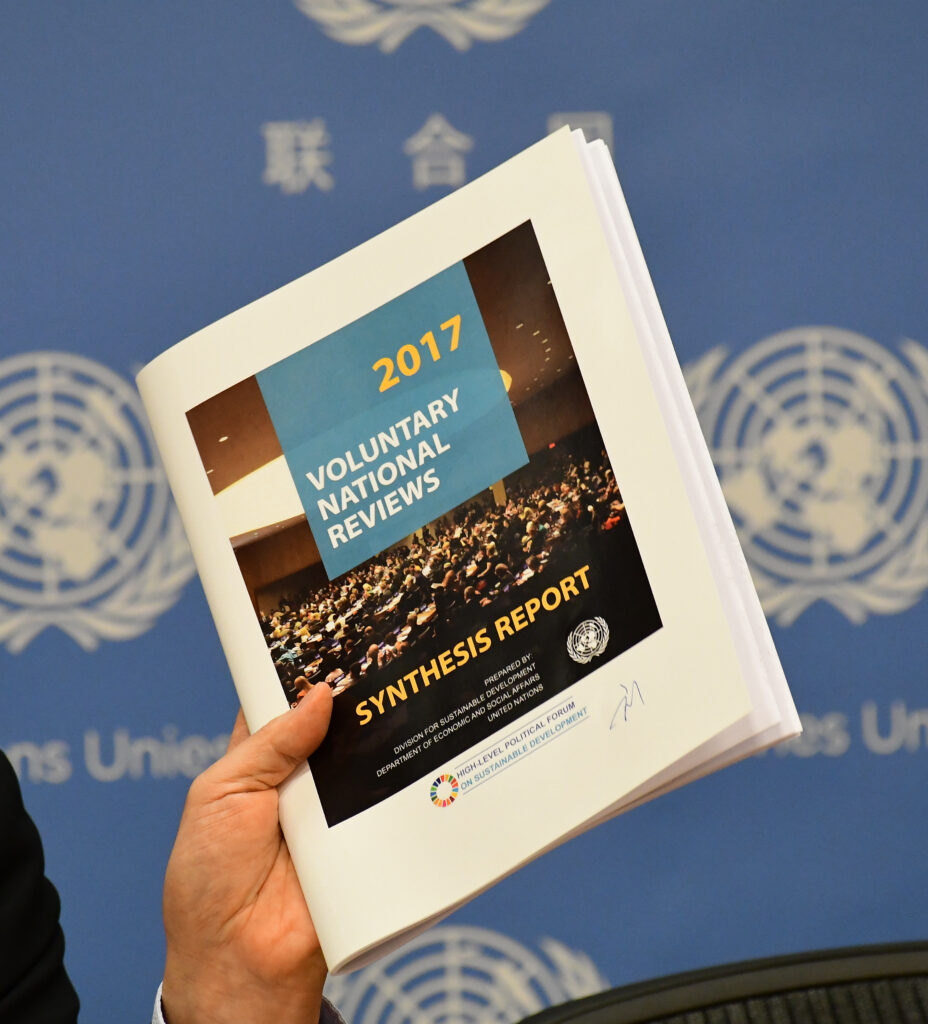
Civil society actors can participate in, influence and contribute to VNR-related processes – in order to support SDG16+ implementation and accountability – through the following actions:
1. Determine whether your country has volunteered for a VNR – You should verify whether your country has volunteered to present a VNR and identify the national focal point for the review through the UN’s Voluntary National Reviews Database.6
2. Urge your government to review SDG16+ in its VNR – You should urge your government to provide a comprehensive review of all SDG16+ targets and indicators, a review of specific SDG16+ targets and indicators that are most relevant to your national context, or a review of priority themes in SDG16+ in which to cluster relevant SDG16+ targets and indicators.7
3. Determine whether there will be multi-stakeholder participation in preparing the VNR – You should contact the national focal point for the review, the government entity responsible for coordinating or preparing the VNR,8 and any other actors that may be involved in facilitating or supporting stakeholder engagement9 in order to establish whether there will be formal opportunities for civil society actors to participate in preparing the VNR. If no opportunities are planned, you should advocate for a formal mechanism or platform to ensure that civil society can actively and meaningfully contribute to the VNR.10
TIP: 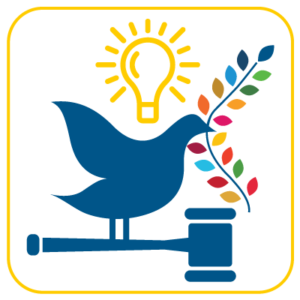

TIP:
Be proactive in reaching out to governments in relation to multi-stakeholder engagement, as many governments may not yet have a process to engage with civil society.
4. Raise awareness of the VNR and build civil society’s capacity for engagement – You can create public awareness of and disseminate information about the VNR process through traditional media, social media and CSO networks in order to promote public interest and engagement in the VNR. You can also help to mobilize and build the capacity of civil society to engage in the VNR process by sharing information, fostering understanding of the VNR and the SDG16+ agenda and identifying opportunities for participation.
5. Participate in formal consultations for the VNR and/or hold independent consultations – You should participate in any in-person or online stakeholder consultations held by the government for the VNR in order to bring attention to SDG16+ progress, as well as gaps and challenges. Where no consultations are planned, you should consider holding independent consultations to gather inputs for the VNR or civil society spotlight reports on SDG16+.11
TIP: 

TIP:
Consider offering advice or practical support to governments well in advance of VNR consultations in order to ensure that the consultation process is conducted in a meaningful, inclusive, participatory, transparent and accessible manner for all.
6. Encourage your government to include independent contributions in its VNR report – Contributions from other stakeholders may be in the form of independently written chapters, comments on specific SDGs or targets, or separate inputs included in the annex of the report. For example, Finland’s 2020 VNR report includes an independent assessment from civil society – in addition to the government’s assessment – for each SDG reviewed.12
7. Review the draft VNR report through an SDG16+ lens and provide feedback – In some cases, you may have the opportunity to provide feedback or comments on the government’s draft report. Where this is the case, you should ensure that the report:
8. Produce a civil society spotlight report on SDG16+ – You can also produce a spotlight report to challenge or provide an alternative perspective of SDG16+ implementation in your country.14
9. Participate in the review at the HLPF – You should encourage your government to include civil society stakeholders within their official delegation to the HLPF, as well as within their official presentation. You may also be able to attend or participate in your country’s VNR at the HLPF in an independent capacity, either in-person or remotely.15 All civil society representatives attending the HLPF should consider organizing a side event on their country’s implementation of SDG16+, disseminating civil society spotlight reports on SDG16+ and making official statements or asking questions during their country’s review.
10. Pursue follow-up activities after your country’s VNR – You should use the VNR as a tool to advance SDG16+ implementation and accountability. In particular, you should:
Case Study


Case Study
Bringing Together Civil Society and Government through ‘Ready for Review’ Consultations for the VNRs
Civil Society Platform for Peacebuilding and Statebuilding (CSPPS)
At the start of 2019, CSPPS began its ‘Ready for Review’ (R4R) project, with the support of France’s Ministry of European and Foreign Affairs (MEAE), EU DEVCO, and the TAP Network. The R4R project ultimately aimed to ensure the meaningful inclusion, participation and contribution of civil society during Voluntary National Review (VNR) processes through nationally-held consultations and capacity-building workshops. The project operated in Côte d’Ivoire, the Central African Republic, Chad, Sierra Leone, Timor-Leste, Nigeria and Rwanda. The outcomes of R4R contributed to solid VNRs presented at the 2019 HLPF, and supported a multi-stakeholder approach to these processes.. In follow-up to these activities, both during and after the HLPF, CSPPS organized a peer-to-peer exchange to reflect on the VNR experiences of CSO representatives involved in the project.
As a first step, nationally-held orientation and sensitization workshops were organized, where CSPPS met with national and international stakeholders (such as UNDP and government ministries) in the project countries. Here, they discussed existing collaboration opportunities to ensure civil society’s meaningful inclusion, participation and contribution to the VNR process and the final national SDG report. In the Central African Republic, for example, one of the outcomes of these workshops was that CSPPS and the Central African Republic Ministry of Planning identified an opportunity to join forces with Cordaid, World Vision, and the TAP Network to organize a consultative VNR and SDG workshop in May 2019.
As a second step, the CSPPS Secretariat organized – in coordination with its country-team focal points and local partners – capacity building workshops for local civil society actors in the project countries. CSPPS worked in partnership with a number of International Network on Conflict and Fragility (INCAF) members (e.g. MEAE, EU and UNDP), who provided strategic and political support as well as resources. With the methodological support provided by an external consultant, and in coordination with CSPPS members and local and international partners, CSPPS was able to successfully conduct the workshops, build the capacity of local civil society, capture and compile their recommendations and key messages, and ensure their inclusion and participation in their countries’ VNR consultation process.
Challenges faced in R4R implementation included the following:
Key Take-aways: VNR consultation activities can be a starting point for initiating and improving dialogue and coordination between government and civil society. During these activities, it is important for civil society to realize what its added value is and highlight it. From this intervention, it is clear that civil society understands the opportunities offered by the VNR process and wants to do more. Wherever possible, the VNR workshop planning process should be opened to other local organizations in addition to traditional local partners.
Mainstreaming SDG 16: Using the Voluntary National Review to Advance More Peaceful, Just and Inclusive societies (Global Alliance and TAP Network, 2020)
This resource provides policy guidance, case studies and good practices on advancing SDG 16 implementation by more effectively leveraging the Voluntary National Review (VNR) and post-VNR processes.
Available at: https://www.sdg16hub.org/topic/mainstreaming-sdg-16-using-voluntary-national-review-advance-more-peaceful-just-and-inclusive
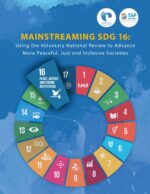
SDG Accountability Handbook: A Practical Guide for Civil Society (TAP Network, 2018)
This handbook provides guidance on the different approaches and steps that can be taken by civil society to ensure national government accountability for the SDGs. It includes a chapter on ‘Contributing to Voluntary National Reviews (VNR).’
Available at: https://sdgaccountability.org/
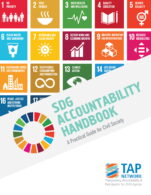
SDG16 in VNRs and Spotlight Reports: Reporting on Progress, Reflecting on Inclusive Accountability Measures and Recommendations for going ahead (GIZ and TAP Network, 2020)
This report evaluates VNR and spotlight reports submitted to the 2019 HLPF for a select group of countries. It examines whether and how spotlight and VNR reports relate to one another and identifies the main commonalities and differences between the perspectives of governments and civil society.
Available at: https://tapnetwork2030.org/wp-content/uploads/2020/05/GIZ_TAP_2020_SDG-16-in-VNRs-and-Spotlight-Reports_Final-Version.pdf
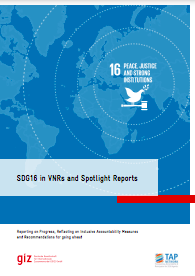
This section of the UN’s HLPF website provides information and resources on VNRs. It includes a database of all countries that have participated or intend to participate in a VNR, with links to documents and reports, statements, partnerships and commitments, and focal points for VNRs.
Available at: https://sustainabledevelopment.un.org/vnrs/
These guidelines – prepared by the UN Secretary-General in 2015 and updated in 2017, 2019 and 2021 – seek to support Member States in conducting VNRs. They provide a framework for certain common elements within VNR reports, while allowing for flexibility so countries can adapt reporting to their own circumstances.
Available at: https://sustainabledevelopment.un.org/content/documents/17346Updated_Voluntary_Guidelines.pdf
This handbook for countries preparing to present VNRs supplements the Secretary-General’s guidelines. It provides elementary building blocks and the basic, practical information on the steps that countries may take when preparing VNRs. Available in the six official UN languages.
Available at: https://sustainabledevelopment.un.org/vnrs/
This resource contains guidance, tools and suggestions for preparing SDG progress reviews at the national level, which can be used in the preparation of the VNR.
Available at: https://unsdg.un.org/resources/guidelines-support-country-reporting-sustainable-development-goals
This resource provides a step-by-step guide for Member States on how to report on SDG 16 through an inclusive and participatory VNR process. It outlines where to include information on SDG 16 in a VNR and provides a compendium of resources and Member State examples.
Available at: https://www.sdg16hub.org/content/global-alliance-guide-report-sdg16-voluntary-national-reviews
These annual reports provide an overview of the approaches and actions taken by countries presenting VNRs in a given year. They showcase best practices, lessons learned, gaps and challenges encountered in working towards the achievement of the SDGs.
Available at: https://sustainabledevelopment.un.org/vnrs/
This annual series of reports, commissioned by civil society and published by Cooperation Canada (formally the Canadian Council for International Co-operation), provides an independent analysis of Voluntary National Review (VNR) reports submitted to the HLPF, including outlining the governance and institutional arrangements of countries.
Available at:
These annual reports identify similarities, differences, progress and emerging trends in VNRs in a given year. They outline general features of the VNRs and analyze national SDG institutional structures, SDG mainstreaming and policy coherence, stakeholder engagement, statistics and data, repeated VNR countries and, in 2020, the impact of the COVID-19 pandemic.
Available at: https://www.partners-for-review.de/resources/
These annual reports provide an analysis of VNR reports to assess whether, and to what extent, countries report on the implementation of SDG 16 or SDG16+.
Available at:
This section of the website of UN DESA contains work by the Committee for Development Policy (CDP) on the topic of VNRs, including several background papers analyzing the VNRs from 2018, 2019 and 2020.
Available at: https://www.un.org/development/desa/dpad/voluntary-national-reviews.html
This report provides a review of the current status of multi-stakeholder engagement in 2030 Agenda implementation based on an assessment of the 158 VNR reports submitted to the HLPF between 2016-2019.
Available at: https://sustainabledevelopment.un.org/content/documents/26012VNRStakeholdersResearch.pdf
This report provides an update on the efforts deployed by CSPPS, its members and partners to strengthen the engagement and capacity of CSOs in fragile and conflict-affected countries participating in the VNR process in 2019. Available in English and French.
Available at: https://cspps.org/publications/reporting-future-final-report-ready-review-2019
Transparency, Accountability &
Participation (TAP) Network
Address: 205 E 42nd St.
New York, NY 10017
Email:
[email protected]